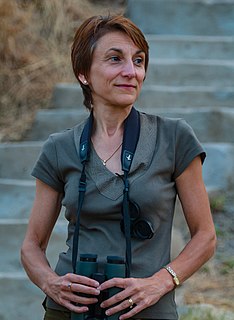Classical conditioning refers to a learning procedure in which a biologically potent stimulus is paired with a previously neutral stimulus. It also refers to the learning process that results from this pairing, through which the neutral stimulus comes to elicit a response that is usually similar to the one elicited by the potent stimulus.
The mesolimbic pathway, sometimes referred to as the reward pathway, is a dopaminergic pathway in the brain. The pathway connects the ventral tegmental area in the midbrain to the ventral striatum of the basal ganglia in the forebrain. The ventral striatum includes the nucleus accumbens and the olfactory tubercle.
Social cognition is a sub-topic of various branches of psychology that focuses on how people process, store, and apply information about other people and social situations. It focuses on the role that cognitive processes play in social interactions.
Motivational salience is a cognitive process and a form of attention that motivates or propels an individual's behavior towards or away from a particular object, perceived event or outcome. Motivational salience regulates the intensity of behaviors that facilitate the attainment of a particular goal, the amount of time and energy that an individual is willing to expend to attain a particular goal, and the amount of risk that an individual is willing to accept while working to attain a particular goal.

The Wellcome Sanger Institute, previously known as The Sanger Centre and Wellcome Trust Sanger Institute, is a non-profit British genomics and genetics research institute, primarily funded by the Wellcome Trust.

The Cambridge Biomedical Campus is the largest centre of medical research and health science in Europe. The site is located at the southern end of Hills Road in Cambridge, England. Over 20,000 people work at the site and is home to a number of organisations including: Cambridge University Hospitals NHS Foundation Trust, Royal Papworth Hospital NHS Foundation Trust, Astra Zeneca's headquarters, Abcam, the Wellcome Trust, Cancer Research UK, the university's medical school, the UK government's Medical Research Council and has National Institute for Health Research Biomedical Research Centre status. It is an accredited UK academic health science centre.

The reward system is a group of neural structures responsible for incentive salience, associative learning, and positively-valenced emotions, particularly ones involving pleasure as a core component. Reward is the attractive and motivational property of a stimulus that induces appetitive behavior, also known as approach behavior, and consummatory behavior. A rewarding stimulus has been described as "any stimulus, object, event, activity, or situation that has the potential to make us approach and consume it is by definition a reward". In operant conditioning, rewarding stimuli function as positive reinforcers; however, the converse statement also holds true: positive reinforcers are rewarding.
Selective amnesia is a type of amnesia in which the sufferer loses certain parts of their memory. Common elements that may be forgotten: relationships, special talents, where they live, abilities in certain areas
Pendleton Read Montague, Jr. is an American neuroscientist and popular science author. He is the director of the Human Neuroimaging Lab and Computational Psychiatry Unit at the Fralin Biomedical Research Institute at VTC in Roanoke, Virginia, where he also holds the title of the inaugural Virginia Tech Carilion Vernon Mountcastle Research Professor. Montague is also a professor in the department of physics at Virginia Tech in Blacksburg, Virginia and professor of Psychiatry and Behavioral Medicine at Virginia Tech Carilion School of Medicine.
Selective retention, in relating to the mind, is the process whereby people more accurately remember messages that are closer to their interests, values and beliefs, than those that are in contrast with their values and beliefs, selecting what to keep in the memory, narrowing the information flow.
David LaBerge is a neuropsychologist specializing in the attention process and the role of apical dendrites in cognition and consciousness.
Mark Schaller is a psychological scientist who has made many contributions to the study of human psychology, particularly in areas of social cognition, stereotyping, evolutionary psychology, and cultural psychology. He is a Professor of Psychology at the University of British Columbia.

Childhood memory refers to memories formed during childhood. Among its other roles, memory functions to guide present behaviour and to predict future outcomes. Memory in childhood is qualitatively and quantitatively different from the memories formed and retrieved in late adolescence and the adult years. Childhood memory research is relatively recent in relation to the study of other types of cognitive processes underpinning behaviour. Understanding the mechanisms by which memories in childhood are encoded and later retrieved has important implications in many areas. Research into childhood memory includes topics such as childhood memory formation and retrieval mechanisms in relation to those in adults, controversies surrounding infantile amnesia and the fact that adults have relatively poor memories of early childhood, the ways in which school environment and family environment influence memory, and the ways in which memory can be improved in childhood to improve overall cognition, performance in school, and well-being, both in childhood and in adulthood.
Mark A. McDaniel is an American psychology researcher in the area of human learning and memory. He is one of the most influential researchers in prospective memory, but also well known for other basic research in memory and learning, cognitive aging, as well as applying cognitive psychology to education. McDaniel has published over 100 peer-reviewed articles, book chapters, and edited books. His research in memory and cognition has received over two million dollars in grant support from NIH and NASA.
Professor Warren Meck was a professor in psychology and neuroscience at Duke University. His main field of interest was Interval-Timing mechanisms and subjective time perception. He was editor in chief in the journal of Timing & Time Perception. He introduced an interesting time perception model in 1984 and 2005. He explained that time is created in a dedicated module in the certain internal clock. Meck has over 19,000 citations in google scholar.
Pavlovian-instrumental transfer (PIT) is a psychological phenomenon that occurs when a conditioned stimulus that has been associated with rewarding or aversive stimuli via classical conditioning alters motivational salience and operant behavior. Two distinct forms of Pavlovian-instrumental transfer have been identified in humans and other animals – specific PIT and general PIT – with unique neural substrates mediating each type. In relation to rewarding stimuli, specific PIT occurs when a CS is associated with a specific rewarding stimulus through classical conditioning and subsequent exposure to the CS enhances an operant response that is directed toward the same reward with which it was paired. General PIT occurs when a CS is paired with one reward and it enhances an operant response that is directed toward a different rewarding stimulus.

Jane Louise Hurst is the William Prescott Professor of Animal Science at the University of Liverpool. She is Head of Mammalian Behaviour & Evolution. She studies scent communication between mammals, as well as animal welfare and pest control. She served as the President of the Association for the Study of Animal Behaviour from 2010 to 2012.
Catherine "Cathy" J. Price is a Professor of Cognitive Neuroscience and Director of the Wellcome Trust Centre for Neuroimaging at University College London.
Kathryn Rachel Ayscough is a Professor of Molecular Cell Biology and Head of the Department of Biomedical Science at the University of Sheffield. She was awarded the 2002 Society for Experimental Biology President's Medal. Her research investigates the role of the actin cytoskeleton in membrane trafficking and cell organisation.

Courtney A. Miller is an American neuroscientist and Professor of the Department of Molecular Medicine at the Scripps Research Institute in Jupiter, Florida. Miller investigates the biological basis of neurological and neuropsychiatric diseases and develops novel therapeutics based on her mechanistic discoveries.





